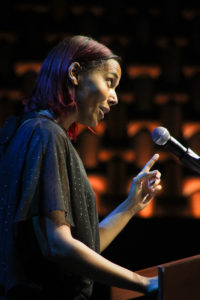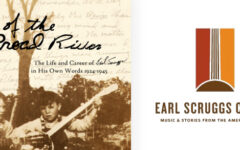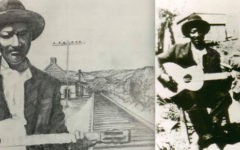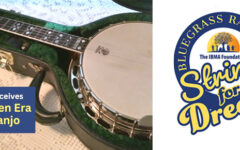
Rhiannon Giddens remembers being shocked when an aunt from what she calls “the black side of the family” called herself a hillbilly. Hillbillies, in the stereotyped definitions of the media and television entertainment, were white.
And as the daughter of a white father and black mother, she said that when she first started playing string band music, “I felt like an interloper.” Or, as she told a packed house during Tuesday’s keynote address at IBMA’s World of Bluegrass conference, “like the raisin in the oatmeal.” When that remark was greeted by silence, she noted, “It’s OK to laugh.” The overwhelmingly white audience did.
From then on, Giddens seemed to have the crowd in her pocket. Her comments were greeted by frequent applause, and at the end of her talk, she received a standing ovation and the most prolonged applause of any speaker in recent memory.
Giddens shattered long-held stereotypes, including some that she once embraced herself. The banjo is not, as she thought growing up, an invention of the mountains, but has roots in Africa. And bluegrass is not solely a descendant of Scottish and Irish music, but of the banjo and fiddle players in Africa, too. By the time she was done, she had systematically dismantled the myth of a homogenous Appalachia.
After running through the list, and noting all the handwringing by people who wonder why bluegrass is so white, she called for reframing the debate..
“The question shouldn’t be how do we get diversity into bluegrass but how do we get diversity BACK into bluegrass,” said Giddens, who played in the Carolina Chocolate Drops – the first black string band to play the Grand Ole Opry before starting a solo career. Later, she added, “I want to celebrate the racial diversity of the music that is so much a part of my identity.”
The keynote address on the first day of IBMA’s World Bluegrass conference is often sparsely attended, and in recent years it has seemed attendees were more interested in finger foods and banana pudding than in listening to the well crafted and well meaning words delivered by the speaker.
Don’t get me wrong, I have heard some wonderful keynote addresses since I started coming to IBMA in 2010. But this year’s address, in my mind, will set the standard by which future keynotes will be measured. The house was packed and the message was powerful. The banana pudding wasn’t memorable.
With much focus on diversity – within IBMA and in the country as a whole – Giddens was the perfect choice to rattle cages and maybe convince some people to rethink their notions.
But the speech is just the start, as Giddens herself noted.
“We have a lot of work to do,” she said. “We have to tear down those artificial divisions.”
It’s a commendable goal for IBMA to embrace. After all, Giddens said as she quoted a music executive, “You don’t hear color. You hear music.”








